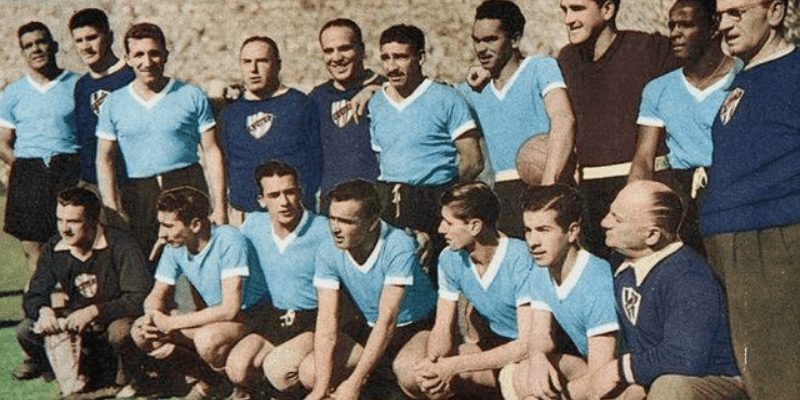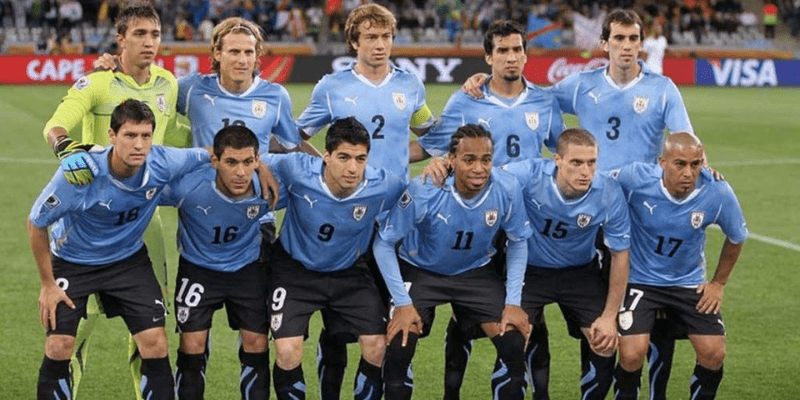In the saturated world of football legends, every nation clings to the name of a hero etched in their records. For Uruguay — a country whose footballing DNA oozes pride and passion — that name today belongs to Luis Suárez. The top scorer in Uruguay national team history, Suárez’s journey with “La Celeste” is one of fierce ambition, pressure, controversy, and ultimately, immortal legacy.
Below, KorKick will take you through the rise of Uruguay’s all-time marksman, compare him with other legendary scorers, explore his trajectory, and reflect on what it means for the future of Uruguayan football.
The Reign of Luis Suárez: Uruguay’s Record-Breaker

When the Uruguay national team steps onto the pitch, Suárez’s name looms like a tower in its attack history. Over his 17-year international stint (2007–2024), he made 143 appearances and scored 69 goals, thereby securing his place as the top scorer in Uruguay national team history. In doing so, he overtook other Uruguayan greats and claimed a record many feared would never be broken.
Suárez officially announced his retirement. His final tally—69 goals in 143 caps—cements a legacy few can rival.
Key Milestones & Context
- Debut & early days: Suárez debuted for Uruguay on 7 February 2007 against Colombia.
- Climbing the charts: He became Uruguay’s top scorer in mid-2013 after a brace against Tahiti in the Confederations Cup, surpassing previous holders.
- Consistency over time: His scoring was not limited to bursts; he delivered in qualifiers, Copa América, friendly fixtures, and World Cups alike.
- Farewell & closure: His last match came in 2024, and as he stepped aside, the record will stand until the next attack prodigy emerges.
His goal ratio—roughly 0.48 goals per match—is also a testament to consistency at the highest level. n.wikipedia.org/wiki/Uruguay_national_football_team_records_and_statistics?utm_source=chatgpt.com))
Other Legends: Who Comes Close?
While Suárez towers above the rest now, Uruguay’s history is rich with goal-scoring legends. Let’s look at the runners-up and their stories.
| Rank | Player | Goals | Caps | Approx. Ratio | Era / Notes |
| 2 | Edinson Cavani | 58 | 136 | ~0.43 | Suárez’s contemporary and worthy rival. |
| 3 | Diego Forlán | 36 | 112 | ~0.32 | A cult hero, especially for his performances in World Cups. |
| 4 | Héctor Scarone | 31 | 51 | ~0.61 | An older generation giant. |
| 5 | Ángel Romano | 28 | 69 | ~0.41 | Active in a period where football was far less globalized. |
| 6 | Óscar Míguez | 27 | 39 | ~0.69 | Especially remembered for his World Cup exploits in Uruguay’s golden era. |
| 7 | Sebastián Abreu | 26 | 70 | ~0.37 | A journeyman striker beloved by fans for flair and stories. |
Cavani remains the closest in recent memory—and a plausible successor had he continued. But with Suárez’s retirement, that chase is paused for now.
One note: some older tallies include matches not officially recognized by FIFA, which complicates comparisons for early-era players.
Anatomy of the Record: Strengths Behind the Numbers

Breaking a national scoring record does not happen by chance. Suárez’s record is built on several pillars:
Versatility Across Competitions
Suárez scored in:
- World Cup qualifiers
- Copa América tournamentsFriendly and exhibition matches**
- Intercontinental fixtures
He proved capable of stepping up regardless of stage or pressure.
Longevity & Fitness
You don’t reach 143 caps without consistency. Suárez sustained form, stayed relevant, and avoided career-ending dips.
Mental Resilience in Big Games
Some of his most memorable goals came at crucial moments:
- In Copa América runs
- In World Cup group stages
- In qualification deciders
His ability to deliver under pressure elevated his status.
Evolution of Playstyle
Suárez matured from a raw poacher into a more complete forward—linking play, dropping deeper, providing assists—while still retaining his finishing edge. This evolution kept him relevant as defenses adapted.
All these factors combined to allow Suárez to surpass decades of Uruguayan history in goalscoring.
Contextualizing the Record: What It Means for Uruguay

Records don’t exist in a vacuum—they reflect eras, teams, and national identity. Suárez’s ascent signals several things for Uruguay’s footballing narrative:
A Modern Benchmark for Future Strikers
For young Uruguayan forwards—Darwin Núñez, Facundo Pellistri, others—Suárez’s total becomes a mountain to climb. They now have a target not just for personal glory, but to embody national pride.
A Bridge Between Generations
His career spanned multiple generations: from teammates who played in South America’s classic systems to players born after his debut. In this way, Suárez helps glue together Uruguay’s footballing identity across epochs.
A Hard Act to Follow
Beyond pure scoring, his personality, influence, clutch moments, and controversies carved a larger-than-football legacy. Replacing his presence—not just goals—is a challenge for national squads.
Room for New Legends
With Suárez’s retirement, the scorers’ list is wide open. Cavani’s era is mostly over, Forlán and others are. Uruguay’s next record may belong to a fresh name—if they seize their moment.
Did Any Achievements in World Cups or Copa América Contribute Especially?
Yes. Some of Suárez’s most iconic goals were on football’s biggest stages:
- World Cups: Suárez scored in four editions (2010, 2014, 2018, 2022), making him one of the few Uruguayans to find the net across multiple tournaments.
- Copa América 2011: Uruguay won the title, and Suárez contributed decisively, earning recognition as one of the tournament’s best players.
- Qualifiers and critical matches: He frequently popped up in qualification campaigns to secure Uruguay’s passage to tournaments.
Each tournament contributed threads to the tapestry of his record, giving weight beyond mere numbers.
What the Future Holds: Will Anyone Surpass Him?
With Suárez gone, the race is open—though not easy.
- Edinson Cavani is still the most obvious challenger, but his window is closing. His 58 goals already linger in history.
- Younger players like Darwin Núñez and other emerging Uruguayan forwards have to balance club commitments, risk of injuries, and consistent national call-ups.
- Structural changes (playing style, formation, tournament cycles) may influence how many chances a striker gets to score.
But records are made to be broken—and to inspire new chapters in a national story.
Conclusion
The top scorer in Uruguay national team history is Luis Suárez—his legacy sealed with 69 goals in 143 matches. In this article, KorKick has traced how he built that record, who trailed behind, and what it means for the future of Uruguayan football.
As fans, we remember more than the goals—we remember the moments, the faces, the roar of the stadium. Suárez’s story now becomes part of the lore young strikers will aim to surpass. If you enjoyed this deep dive, stick with KorKick for more player profiles, legendary stat breakdowns, and evolving narratives in world football.
Do you want a Top 10 list of Uruguay’s top scorers or a profile of Darwin Núñez’s potential to break the record next? I’m ready when you are.






